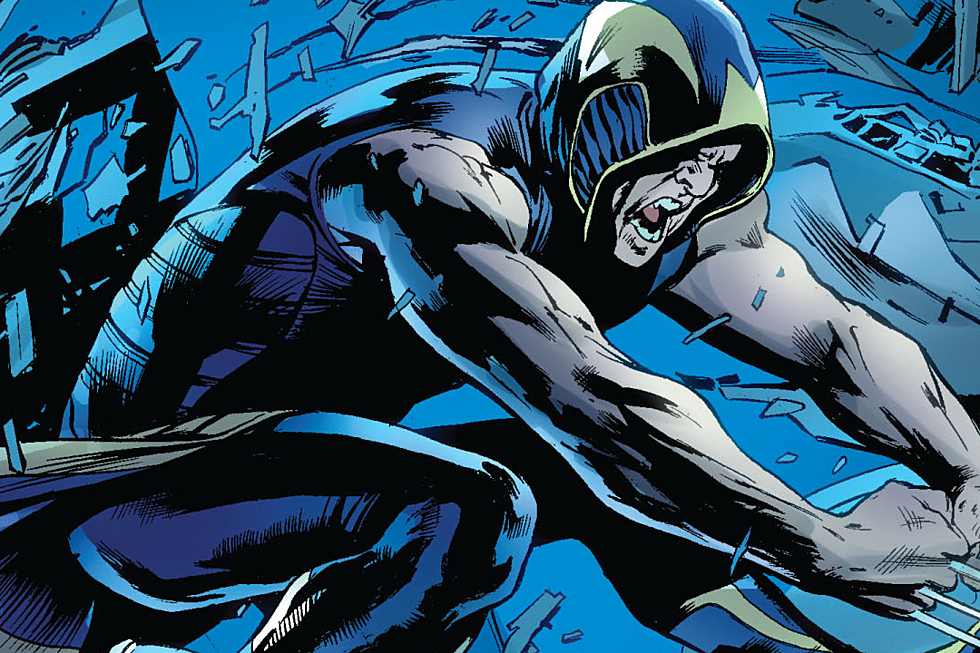
Reality TV and Comics: The Impact of Fiction on Reality on Fiction

How long has it been? Fifteen years? More? There really was a time before reality television, when everyone got along fine without a weekly dose of unbalanced rednecks, craven housemates, dance instructors, and wannabe-models wolfing down plates of deep-fried baboon testicles. Whatever television, entertainment, or culture used to be, it was eviscerated, consumed, regurgitated, and consumed again by that first ghastly kiss that concluded Who Wants to Marry a Millionaire? Now comic books are turning to reality TV for inspiration and marketing strategies in earnest. Does that make superheroes more real, or reality TV more fake? With America's Got Powers by Jonathan Ross and Bryan Hitch on stands, and more reality TV-based comics on the way, it's time to dig in. To the discussion, not the baboon balls.America's Got Powers is a concept that really pops. When a strange event gives thousands of San Francisco children superpowers, they grow up to be reality television stars in "America's Got Powers," a brutal tournament to determine who gets to join the world's only superteam, Power Generation. With smart writing from Jonathan Ross and Bryan Hitch's typical double-page-spread artillery, it's novel, exciting, and relentlessly clever.
AGP looks at the what-if of superpowers through a cynical lens, positing that the government would simultaneously please the so-called "Stoners" while keeping them under control. The solution is to sedate them with fame, entering them in a televised competition that's nearly as grotesque, lucrative, and violent as American Idol. It's an interesting take on the phenomenon of reality television in a world suddenly full of reality comics.

The comics/reality TV trend has been growing slowly but steadily over the last few years, and 2012 seems to be the year that it's going to blow up. Four months into the last year of the Mayan calendar and there are half-a-dozen comics on the stands or on the way where reality television is central to the plot: Hoax Hunters from Image; A.D.D.: Adolescent Demo Division from Vertigo; "Challengers of the Unknown" in DC Universe Presents,;AGP; Aspen Comics' vote-in comic Idolized, and probably so many more that I don't know about. And of course Stan Lee -- who once hosted a reality show, Who Wants to Be a Superhero? -- is getting into the mix with Stan Lee's Mighty 7. The reality television phenomenon is on its way to conquer comics, and it's riding a lightspeed toboggan from hell.
The thing is, it's hard to say when it started. Stan Lee's Mighty 7 advertises itself as "the world's first reality comic book." Whatever that is, Mighty 7 ain't it. There was Marvel's reality TV-themed New Warriors in the mid-2000s, which went on to figure heavily into the era-defining "Civil War" event. The first English adaptation of the manga Battle Royale rewrote military project "The Program" to be a reality show. Peter Milligan and Mike Allred's quirky, cynical runs on X-Force and X-Statix made a group of mutants television superstars, dripping with satire on media and superheroes. Along with those starring attractions, reality shows made cameos in 52, Marvel's "I Am Captain America" marketing initiative, Final Crisis' "Super Young Team," et cetera. It's especially hard to say when comics started involving reality tv, since reality tv existed in fiction long before it existed in reality.

Before it came into being, before it even had a name, the idea of reality television floated around in science fiction and comics. The Deadly Game Show motif is a classic, with practitioners running from Stephen King to The Joker. George Orwell offered surveillance as entertainment in 1984. As soon as writers began to comment on television and media, Phillip K. Dick, Harlan Ellison, and others explored the idea of reality television. If someone out there with a ridiculously encyclopedic knowledge of all things sci-fi knows when and where, please, tell me. I must know the width and breadth of this thing.
In comics, again, it's hard to say when reality tv made its first appearance. In John Byrne's Next Men, a group of superpowered test-subjects became the subjects of mid-1990s media frenzy. In 1989, Grant Morrison and Richard Case's Doom Patrol featured an appearance by a Japanese superhero with his own tv show, "The Adventures of New Sunburst." Again, there are probably several earlier instances far beyond my sphere of awareness, which is admittedly mid-sized, a sedan at best. Ultimately, the when and where isn't even that interesting.

The interesting thing is that we can clearly see the impact fiction has on reality, and vice versa. The relationship between the real and the imagined, if you believe that type of thing can be observed, is on display like never before. Am I making sense here? The concept of reality television is imagined and hangs around in fiction for a few decades. In 1999, it becomes real, and after a few years, reality shows outnumber and outdraw fiction programs.
Then fiction pokes back, following the initial craze with an era of scripted shows generally agreed to be a new crescent for the medium. Reality television spawns a subset of obviously scripted shows. Then fiction takes its idea back, with countless TV shows, movies, and stories about the phenomenon. Now 2012 looks like it might be the year of "reality comics," USA Today thinks America's Got Powers is awesome, and more significantly, The Hunger Games threads arrow after arrow into Twilight's gooey preteen heart.
If you hate "reality comics" or whatever you want to call them, too bad. They're here. The invasion has only begun, and it was over before it began, and it began a long time ago anyway.
Preview of America's Got Powers:






More From ComicsAlliance

![Batman’s Having Some Trouble With His Basement In ‘Justice League’ #9 [Exclusive Preview]](http://townsquare.media/site/622/files/2016/11/JL09a.jpg?w=980&q=75)


![Chip Kidd: Remixing Batman And Designing Super-Solutions [Interview]](http://townsquare.media/site/622/files/2014/08/Untitled-130.jpg?w=980&q=75)

![War Rocket Ajax Early Edition: Manhattan Projects, Ghost Rider, And Real Heroes [Podcast]](http://townsquare.media/site/622/files/2014/03/Untitled-13521.jpg?w=980&q=75)
![Brian Michael Bendis and Bryan Hitch’s ‘Age of Ultron’ #1 Dispenses With Preamble [Advance Review]](http://townsquare.media/site/622/files/2013/03/ageofultron1top.jpg?w=980&q=75)

